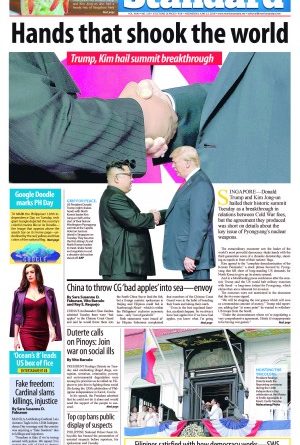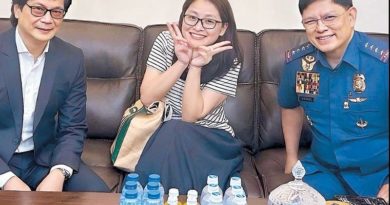ASEANEWS HEADLINES: Hands that shook the world Trump, Kim hail summit breakthrough
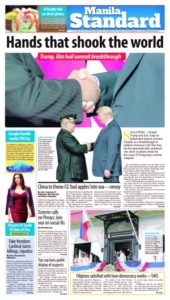 Singapore—Donald Trump and Kim Jong-un hailed their historic summit Tuesday as a breakthrough in relations between Cold War foes, but the agreement they produced was short on details about the key issue of Pyongyang’s nuclear weapons.
Singapore—Donald Trump and Kim Jong-un hailed their historic summit Tuesday as a breakthrough in relations between Cold War foes, but the agreement they produced was short on details about the key issue of Pyongyang’s nuclear weapons.
The extraordinary encounter saw the leader of the world’s most powerful democracy shake hands with the third generation scion of a dynastic dictatorship, standing as equals in front of their nations’ flags.
Kim agreed to the “complete denuclearization of the Korean Peninsula,” a stock phrase favored by Pyongyang that fell short of long-standing US demands for North Korea to give up its atomic arsenal.
And in a blockbusting press conference after the summit, Trump said the US would halt military exercises with Seoul—a long-term irritant for Pyongyang, which claims they are a rehearsal for invasion.
The exercises were not mentioned in the document that the two men signed.
“We will be stopping the war games which will save us a tremendous amount of money,” Trump told reporters, adding that “at some point” he wanted to withdraw US troops from the South.

“Under the circumstances where we’re negotiating a very comprehensive agreement, I think it’s inappropriate to be having war games.”
That sparked an immediate reaction from analysts.
“Two more Trump concessions just in this presser: stopping US-S Korea military exercises and hope to withdraw US troops from SK,” tweeted Robert Kelly, professor of Political Science at Pusan National University.
“And what have we gotten from NK for these? STOP GIVING STUFF AWAY for nothing.”
After a day filled with smiles and compliments in the sumptuous setting of a luxury Singapore hotel that was watched around the world, the US “committed to provide security guarantees” to North Korea.
Ahead of the meeting, critics expressed concerns that it risked being more about media headlines than substantive progress.
Asked about denuclearization—the crux of the summit—Trump said, “we’re starting that process,” adding that it would begin “very, very quickly.”
Speaking to reporters, he said there would be a process of verification involving “a lot of people,” but gave no concrete details.
He also insisted that US sanctions would remain in place until Washington had seen progress.
The text of the two men’s agreement made no mention of previous US demands for “complete, verifiable and irreversible denuclearization”—jargon for scrapping weapons and committing to inspections.
Melissa Hanham of the US-based Center for Nonproliferation Studies said on Twitter that North Korea had “already promised to do this many times,” adding the two sides “still don’t agree on what ‘denuclearization’ means.”
In neutral Singapore, the leaders, who had previously hurled insults like “mentally deranged” and “little rocket man,” showered compliments on each other.

Trump said he had formed a “special bond” with Kim, whose regime has been accused of multiple human rights abuses and who is suspected of ordering the assassination of his brother at a Malaysian airport last year.
“We’ll meet again,” Trump said after a signing ceremony, standing with Kim on the verandah where they first met. “We will meet many times.”
Trump said he “absolutely” would be willing to invite Kim to the White House.
For his part, Kim said the two Cold War foes had vowed to “leave the past behind,” pledging “the world will see a major change.”
The extraordinary summit—unthinkable only months ago—comes after Washington and Pyongyang appeared on the verge of conflict late last year as the leaders slung personal insults and Kim conducted nuclear and missile tests.
Critics said the mere fact of the meeting meant Trump was legitimizing Kim, who critics say runs a police state where human rights are routinely trampled.
Trump told reporters that he had raised the issue of human rights “strongly.”
“We will be doing something on it. It’s rough. It’s rough in a lot of places, by the way,” he added.
The Singapore summit is a potentially legacy-defining meeting for both men—comparable to Richard Nixon’s 1972 visit to China, or Ronald Reagan’s 1986 summit with Mikhail Gorbachev in Reykjavik.
But many agreements have been made in the past with North Korea that have later fallen apart.
“It’s a huge win for Kim Jong-un, who now—if nothing else—has the prestige and propaganda coup of meeting one-on-one with the president, while armed with a nuclear deterrent,” said Michael Kovrig, Crisis Group Senior Adviser for North East Asia. / posted June 13, 2018 at 01:45 am by AFP
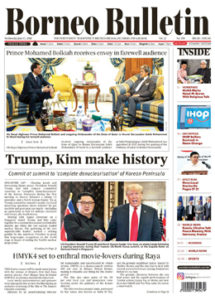



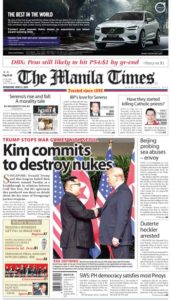
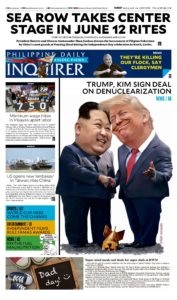
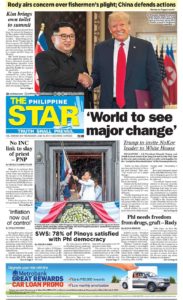
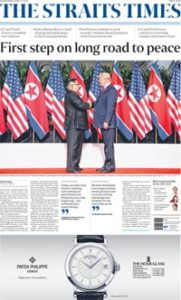
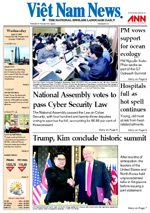
All photographs, news, editorials, opinions, information, data, others have been taken from the Internet ..aseanews.net | [email protected] / For comments, Email to : Aseanews.Net | [email protected] | Contributor

